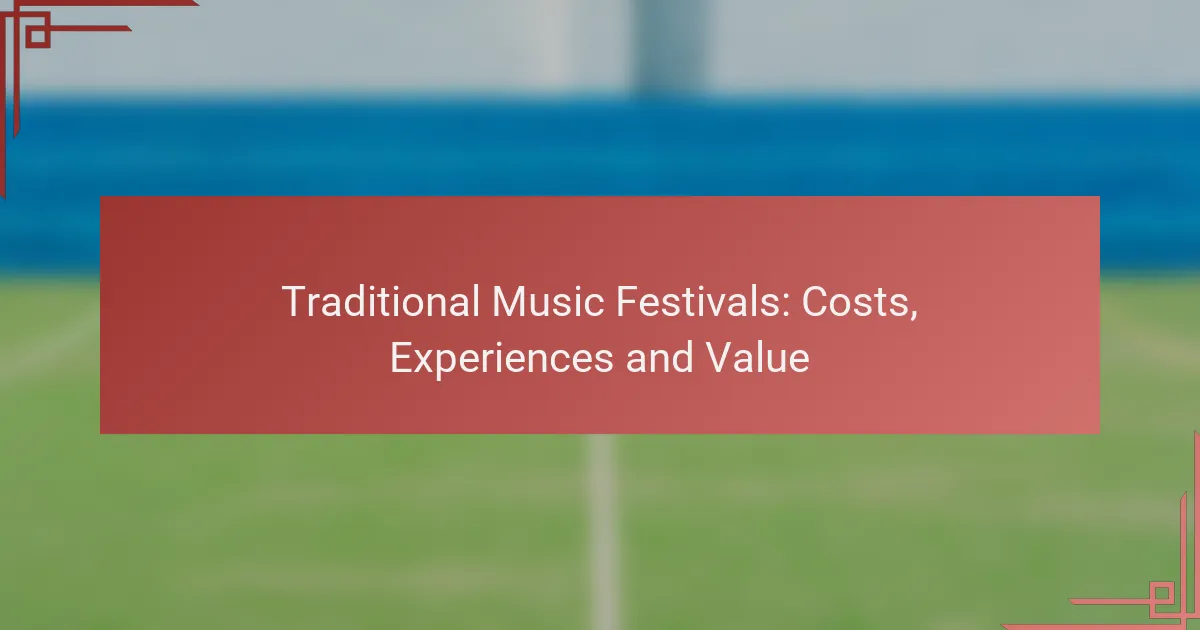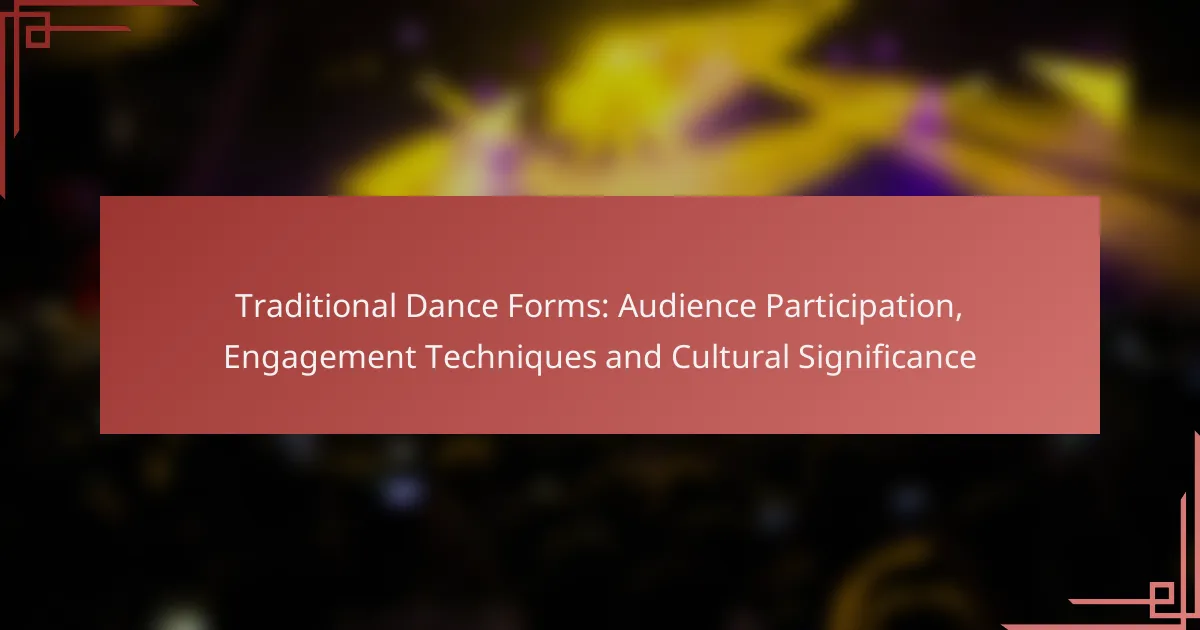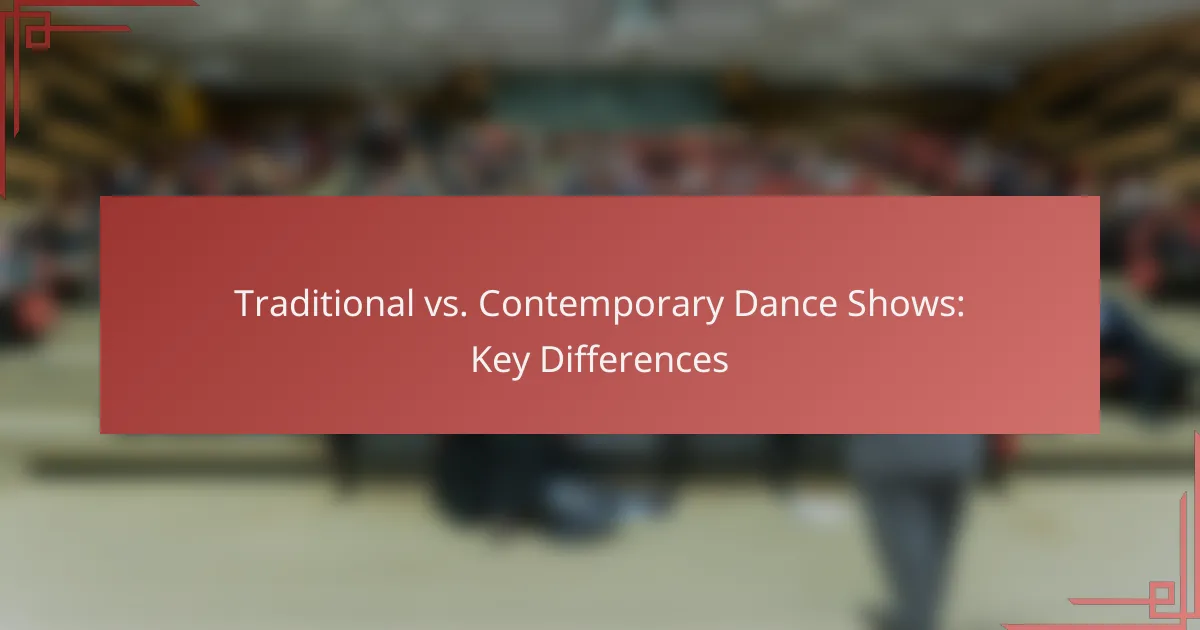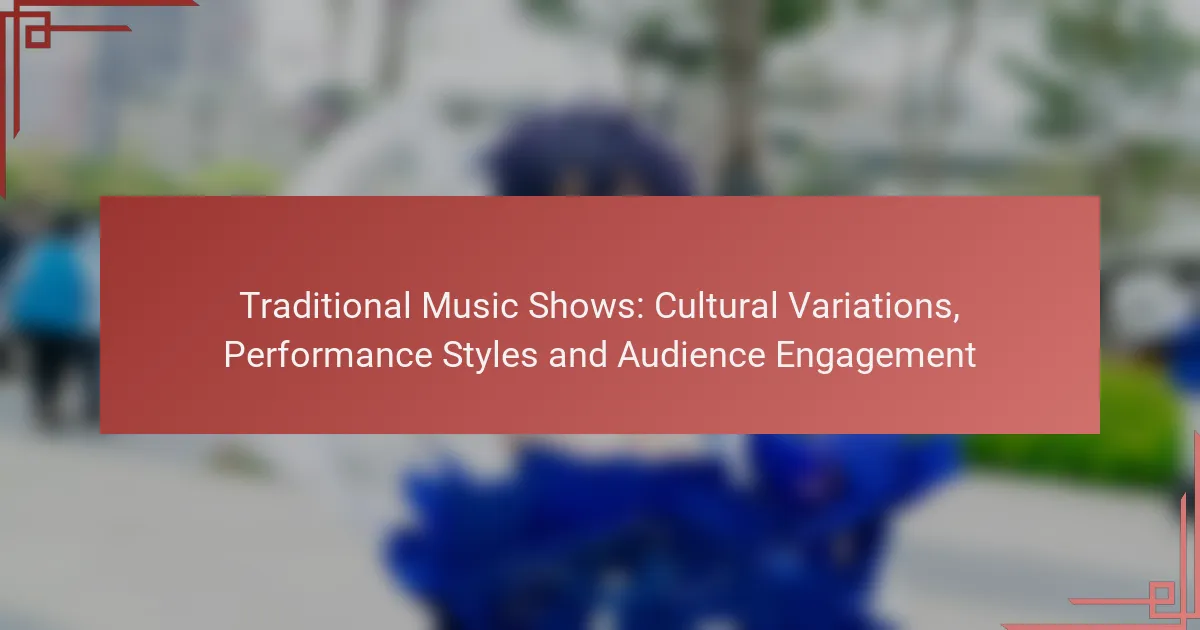Traditional music festivals in the UK provide a unique opportunity to immerse oneself in local culture while enjoying live performances and community interactions. However, costs can vary widely based on factors such as the festival’s popularity and location, necessitating careful budgeting for tickets, accommodation, and other expenses. These festivals not only celebrate cultural heritage but also foster connections among attendees, creating memorable experiences that differ significantly from modern music festivals.
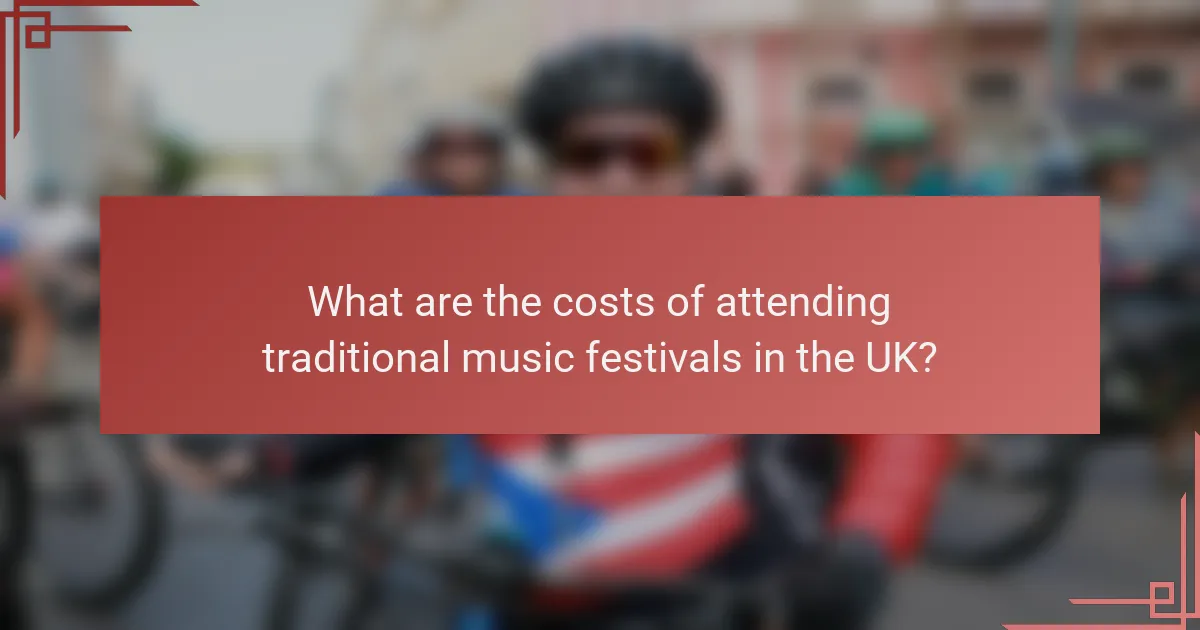
What are the costs of attending traditional music festivals in the UK?
Attending traditional music festivals in the UK can vary significantly in cost, depending on factors such as the festival’s popularity, location, and duration. Budgeting for tickets, accommodation, travel, food, and additional fees is essential for a complete experience.
Ticket prices for major festivals
Ticket prices for major traditional music festivals in the UK typically range from £100 to £300 for a weekend pass. Popular festivals like Glastonbury or Cambridge Folk Festival may charge higher prices, especially for early bird tickets. It’s advisable to purchase tickets well in advance to secure the best rates.
Accommodation expenses
Accommodation costs can vary widely, with options ranging from camping on-site for free or a nominal fee to booking hotels or B&Bs that can cost £50 to £200 per night. Many attendees choose to camp to save money, but booking early is crucial as spaces fill up quickly.
Travel costs
Travel expenses depend on your starting location and mode of transport. Train fares within the UK can range from £20 to £100, while driving may incur costs for fuel and parking, typically around £30 to £60 for the weekend. Consider using public transport for convenience and cost savings.
Food and drink budget
Food and drink budgets at festivals can add up quickly, with daily costs averaging £20 to £50 per person. Many festivals offer a variety of food stalls, but prices can be higher than usual. Bringing your own snacks and a refillable water bottle can help manage expenses.
Additional fees and charges
Additional fees may include charges for parking, locker rentals, or VIP experiences, which can range from £10 to £100. Be aware of potential service fees when purchasing tickets online. Always check the festival’s website for any hidden costs to avoid surprises.
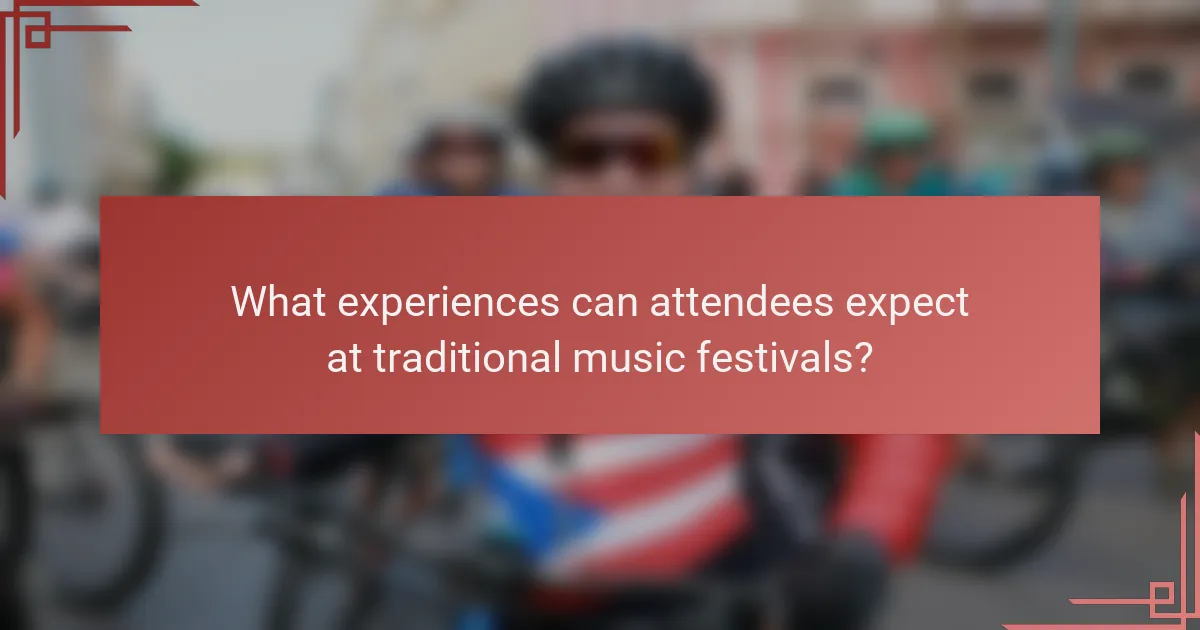
What experiences can attendees expect at traditional music festivals?
Attendees at traditional music festivals can look forward to a rich blend of live performances, cultural activities, and community interactions. These festivals offer immersive experiences that celebrate local heritage and foster connections among participants.
Live performances from renowned artists
One of the main attractions of traditional music festivals is the opportunity to see renowned artists perform live. These performances often feature a mix of local talent and well-known musicians, providing a platform for diverse musical styles. Expect to enjoy everything from folk and bluegrass to world music, often in picturesque outdoor settings.
Ticket prices for these performances can vary widely, typically ranging from low tens to several hundred dollars, depending on the artist’s popularity and the festival’s scale. It’s advisable to purchase tickets early, as popular acts can sell out quickly.
Cultural workshops and activities
Many traditional music festivals offer cultural workshops and activities that allow attendees to engage with the music and traditions of the region. These might include dance lessons, instrument-making workshops, or storytelling sessions that highlight local folklore. Participating in these activities can deepen your appreciation of the cultural context behind the music.
Workshops usually require an additional fee, which can range from modest amounts to higher prices for specialized sessions. Check the festival schedule in advance to plan your participation effectively.
Local food and beverage offerings
Food and beverage offerings at traditional music festivals often showcase local cuisine, providing a taste of the region’s culinary heritage. Attendees can expect a variety of options, from street food stalls to sit-down dining experiences featuring traditional dishes and locally brewed beverages.
Prices for food and drinks can vary, typically ranging from a few dollars for snacks to higher amounts for full meals. Sampling local specialties can enhance your festival experience, so be sure to explore different vendors.
Community engagement and networking
Traditional music festivals serve as a hub for community engagement, allowing attendees to connect with like-minded individuals and local artists. These events often foster a sense of belonging and shared passion for music and culture, making them ideal for networking.
Participating in discussions, joining group activities, or volunteering can enhance your experience and help you build lasting relationships within the community. Take advantage of social media platforms to connect with other attendees before and after the festival.
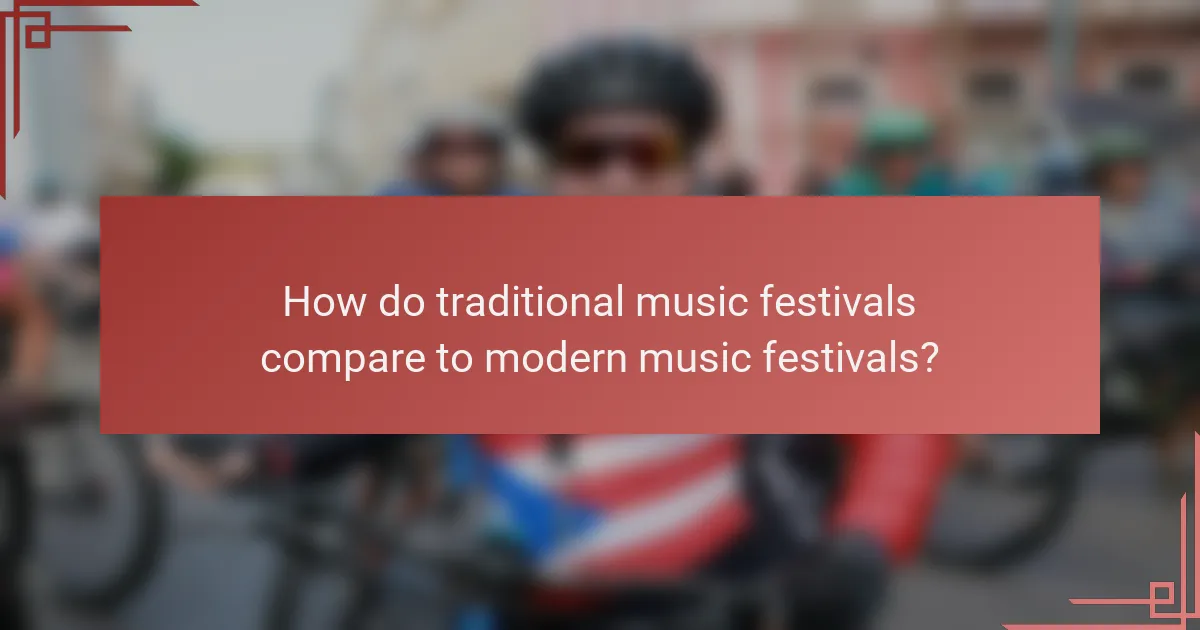
How do traditional music festivals compare to modern music festivals?
Traditional music festivals often emphasize cultural heritage and community engagement, while modern music festivals typically focus on mainstream entertainment and commercial appeal. The experience at each type of festival can vary significantly based on atmosphere, music genres, audience demographics, and pricing structures.
Differences in atmosphere and vibe
The atmosphere at traditional music festivals is usually more intimate and community-oriented, fostering a sense of belonging among attendees. These festivals often feature local customs, crafts, and food, creating a rich cultural experience.
In contrast, modern music festivals tend to have a more commercial vibe, often characterized by large crowds, high-energy performances, and extensive marketing. The focus is primarily on entertainment rather than cultural connection.
Variety of music genres
Traditional music festivals typically showcase folk, classical, or regional music styles that reflect the cultural heritage of a specific area. This can include genres like bluegrass, Celtic, or indigenous music, providing a unique listening experience.
Modern music festivals, however, feature a broader range of genres, including pop, rock, electronic, and hip-hop. This diversity attracts a wider audience but may dilute the cultural significance found in traditional festivals.
Audience demographics
Audience demographics at traditional music festivals often skew towards older generations or those with a strong interest in cultural preservation. Families and local community members frequently attend, fostering intergenerational connections.
Modern music festivals attract a younger crowd, often including teenagers and young adults who are drawn to popular artists and the festival experience itself. This demographic shift can influence the overall atmosphere and activities available at the event.
Pricing structures
Traditional music festivals generally have lower ticket prices, often ranging from free to modest fees, making them accessible to a wider audience. Many are funded by local governments or community organizations, which helps keep costs down.
In contrast, modern music festivals can be significantly more expensive, with ticket prices often reaching hundreds of dollars. Additional costs for food, merchandise, and accommodations can further increase the overall expense, making them less accessible for some attendees.
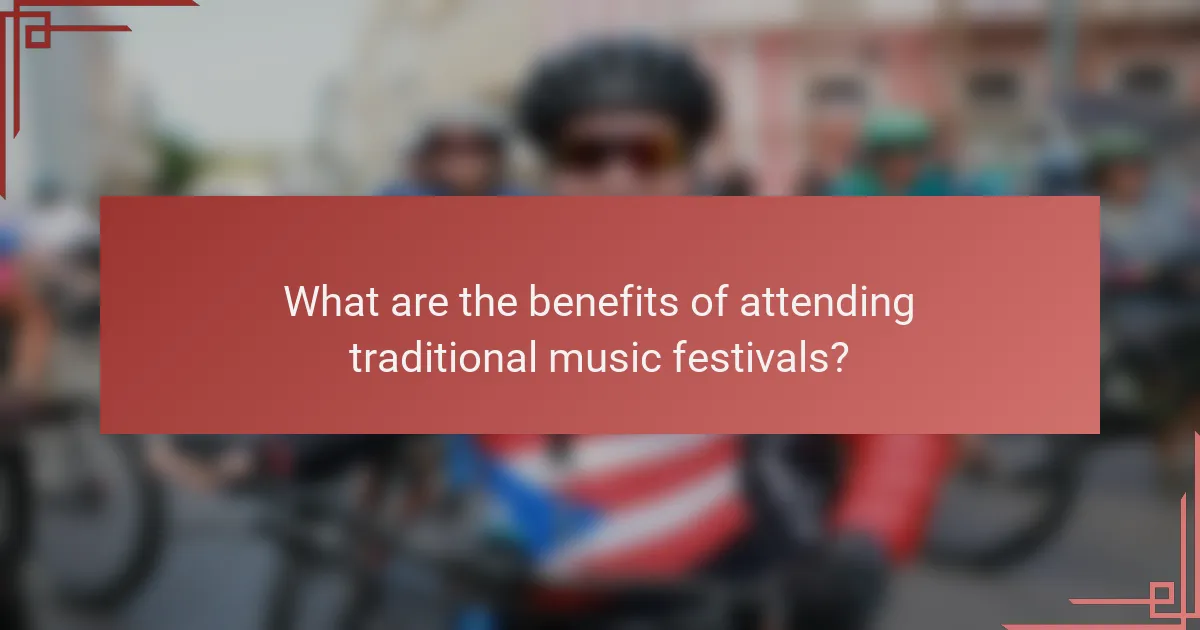
What are the benefits of attending traditional music festivals?
Attending traditional music festivals offers numerous benefits, including cultural enrichment, support for local artists, and unique networking opportunities. These events create immersive experiences that connect attendees with the heritage and artistry of a community.
Cultural immersion
Cultural immersion at traditional music festivals allows attendees to experience the rich heritage of a region. Participants can enjoy authentic performances, traditional food, and local crafts, providing a deeper understanding of the culture. Engaging with local customs and practices enhances appreciation for the community’s history and traditions.
For example, festivals in regions like Appalachia or the Balkans often feature folk dances, storytelling, and workshops, allowing visitors to actively participate rather than just observe. This firsthand experience fosters a genuine connection to the culture.
Support for local artists
Traditional music festivals play a crucial role in supporting local artists by providing them a platform to showcase their talents. These events often feature performances from emerging musicians, helping them gain exposure and build their careers. Attendees can directly contribute to the local economy by purchasing merchandise or donating to artists.
Furthermore, many festivals implement fair compensation practices, ensuring that artists receive a portion of ticket sales or performance fees. This support not only sustains the artists but also enriches the festival experience for attendees.
Networking opportunities
Networking opportunities abound at traditional music festivals, where attendees can meet fellow music lovers, artists, and industry professionals. These connections can lead to collaborations, mentorships, or even job opportunities within the music industry. Engaging with others who share similar interests can foster lasting friendships and professional relationships.
To maximize networking, consider attending workshops or panel discussions often held at these festivals. Participating in these events can provide valuable insights and facilitate introductions to key figures in the music scene.
Unique experiences
Each traditional music festival offers unique experiences that cannot be replicated elsewhere. From the specific genres showcased to the local ambiance, these events create memorable moments for attendees. The combination of music, culture, and community creates an atmosphere that is both festive and intimate.
For instance, festivals like the Newport Folk Festival in the USA or the Edinburgh Festival Fringe in Scotland provide diverse programming that highlights local talent while attracting international acts. These unique experiences contribute to a sense of belonging and appreciation for the arts.
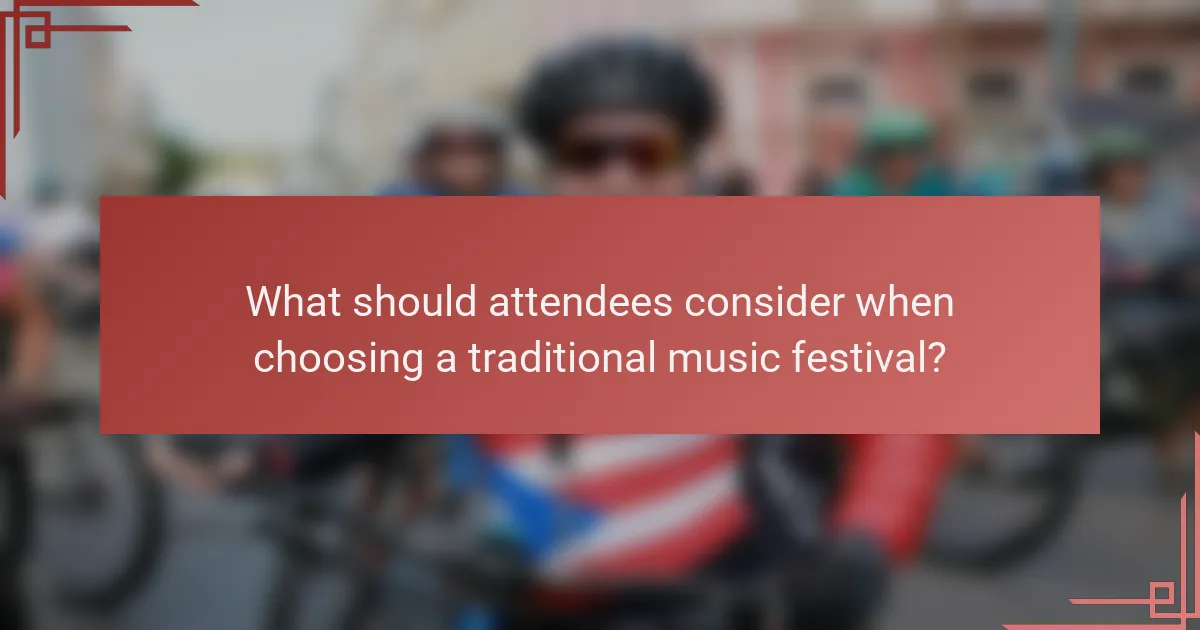
What should attendees consider when choosing a traditional music festival?
Attendees should evaluate factors such as location, accessibility, and the lineup of artists when selecting a traditional music festival. These elements significantly influence the overall experience and enjoyment of the event.
Location and accessibility
The location of a traditional music festival plays a crucial role in your decision. Consider how far you are willing to travel and the available transportation options. Festivals in urban areas may offer better public transport, while rural settings might require a car or shuttle service.
Accessibility is also important for attendees with mobility challenges. Check if the venue provides facilities such as ramps, accessible restrooms, and seating options. Many festivals are now prioritizing inclusivity, so look for information on their websites regarding accommodations.
Lineup of artists
The lineup of artists is a key factor that can make or break your festival experience. Research the performers to ensure they align with your musical tastes. Some festivals feature a mix of well-known acts and emerging artists, providing a diverse experience.
Additionally, consider the schedule of performances. Some festivals may have overlapping sets, which can limit your ability to see all your favorite artists. Review the timetable in advance to plan your day effectively and avoid missing out on must-see performances.
